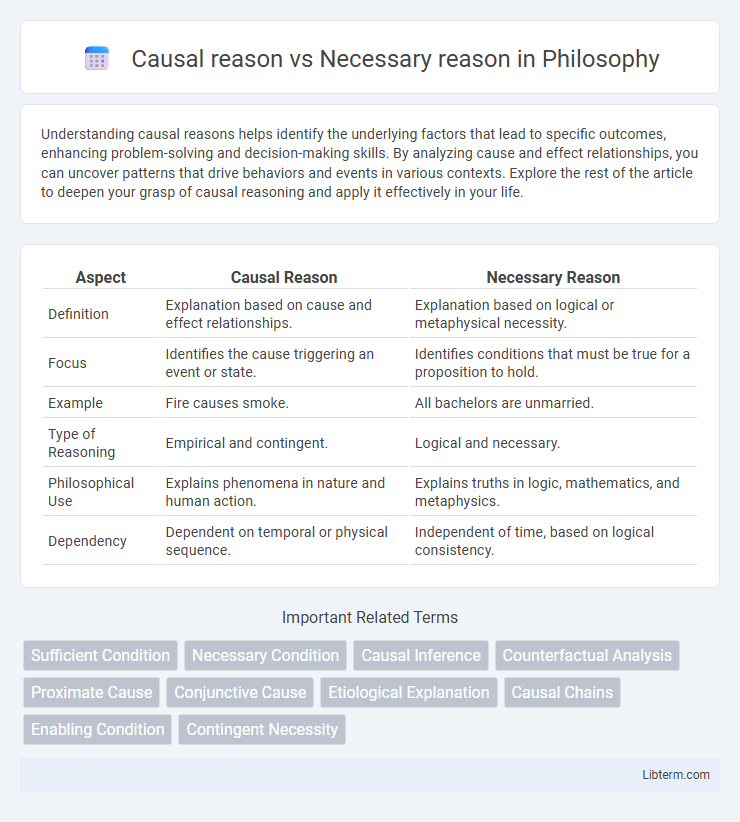Understanding causal reasons helps identify the underlying factors that lead to specific outcomes, enhancing problem-solving and decision-making skills. By analyzing cause and effect relationships, you can uncover patterns that drive behaviors and events in various contexts. Explore the rest of the article to deepen your grasp of causal reasoning and apply it effectively in your life.
Table of Comparison
| Aspect | Causal Reason | Necessary Reason |
|---|---|---|
| Definition | Explanation based on cause and effect relationships. | Explanation based on logical or metaphysical necessity. |
| Focus | Identifies the cause triggering an event or state. | Identifies conditions that must be true for a proposition to hold. |
| Example | Fire causes smoke. | All bachelors are unmarried. |
| Type of Reasoning | Empirical and contingent. | Logical and necessary. |
| Philosophical Use | Explains phenomena in nature and human action. | Explains truths in logic, mathematics, and metaphysics. |
| Dependency | Dependent on temporal or physical sequence. | Independent of time, based on logical consistency. |
Understanding Causal Reason and Necessary Reason
Understanding causal reason involves identifying factors or events that directly produce an effect or outcome, emphasizing a cause-and-effect relationship. Necessary reason refers to conditions or prerequisites that must be present for an event to occur, highlighting the indispensable elements without which the event cannot happen. Distinguishing between causal and necessary reasons clarifies how certain factors initiate change versus those that provide essential support for that change.
Defining Causal Reason: What It Means
A causal reason refers to the specific factor or event that directly produces an outcome, establishing a clear cause-and-effect relationship essential for understanding phenomena in science and philosophy. It identifies how one condition or action brings about another, emphasizing the mechanisms and processes involved in generating a result. Unlike necessary reasons, which indicate conditions that must be present for an event to occur, causal reasons explain the actual source or driver behind the event's occurrence.
Defining Necessary Reason: Key Concepts
Necessary reason refers to a condition or factor that must be present for an event or outcome to occur, implying its indispensability in the causal relationship. Unlike a causal reason that directly causes an effect, a necessary reason does not guarantee the outcome but serves as an essential prerequisite without which the effect cannot happen. Understanding necessary reasons involves identifying indispensable conditions that create a framework within which specific causes operate effectively.
Differences Between Causal and Necessary Reasons
Causal reasons explain why an event occurs by identifying specific factors or conditions that bring about the effect, while necessary reasons refer to conditions that must be present for the event to happen but may not directly cause it. Causal reasons emphasize a direct cause-and-effect relationship, whereas necessary reasons highlight indispensable prerequisites without guaranteeing the outcome. Understanding this distinction is crucial in philosophy, logic, and scientific explanation to clarify the nature of explanations and the roles that different types of reasons play in event occurrence.
Philosophical Foundations of Reasoning
Causal reasons explain events by identifying preceding factors that bring about an effect, emphasizing temporal and mechanistic connections in the philosophical foundations of reasoning. Necessary reasons establish conditions without which a conclusion cannot hold true, highlighting the logical dependency essential for valid inference. Understanding the distinction between causal and necessary reasons deepens insight into how reasoning structures explanations and justifications in epistemology and metaphysics.
Practical Applications in Everyday Life
Causal reason refers to factors that directly bring about an effect or outcome, such as a specific action causing a reaction, while necessary reason identifies conditions that must be present for an outcome to occur but do not guarantee it alone. In practical applications, understanding causal reasons helps in troubleshooting problems, like identifying why a machine stopped working due to a broken part, whereas recognizing necessary reasons aids in planning, such as knowing electricity is required for a device to operate even if other factors also matter. This distinction enhances decision-making in fields like engineering, medicine, and everyday problem-solving by clarifying when an element causes an event versus when it merely enables it.
Examining Examples: Causal vs Necessary
A causal reason explains why an event happens by identifying factors that produce or influence the outcome, such as smoking causing lung cancer through biological mechanisms. A necessary reason refers to a condition that must be present for an event to occur, like oxygen being necessary for fire to burn but not causing fire alone. Examining examples reveals that while causal reasons directly generate effects, necessary reasons are prerequisites without which the effect cannot manifest.
Common Misconceptions and Clarifications
Causal reason often gets mistaken for necessary reason, but they differ fundamentally: causal reasons explain why something happens, while necessary reasons define conditions without which it cannot occur. A common misconception is that every causal reason is also necessary, yet many causal factors are neither sufficient nor indispensable for the outcome. Clarifying this distinction helps in fields like philosophy, law, and science to avoid conflating correlation with necessity, improving logical analysis and decision-making.
Importance in Scientific Research and Analysis
Understanding causal reasons is crucial in scientific research as they identify the specific factors directly influencing an outcome, enabling accurate prediction and intervention. Necessary reasons establish conditions that must be present for an event to occur but may not alone cause the event, ensuring researchers do not overlook essential prerequisites in experimental design. Distinguishing between causal and necessary reasons enhances the validity of scientific analysis and supports the development of reliable theories and applications.
Conclusion: Implications for Critical Thinking
Understanding the distinction between causal reasons and necessary reasons sharpens critical thinking by clarifying how explanations and justifications function differently in arguments. Causal reasons highlight the factors that bring about an event, while necessary reasons identify conditions without which the event cannot occur, guiding more precise evaluation of claims and evidence. This differentiation enables critical thinkers to avoid conflating correlation with essential prerequisites, improving analytical rigor in problem-solving and decision-making.
Causal reason Infographic

 libterm.com
libterm.com